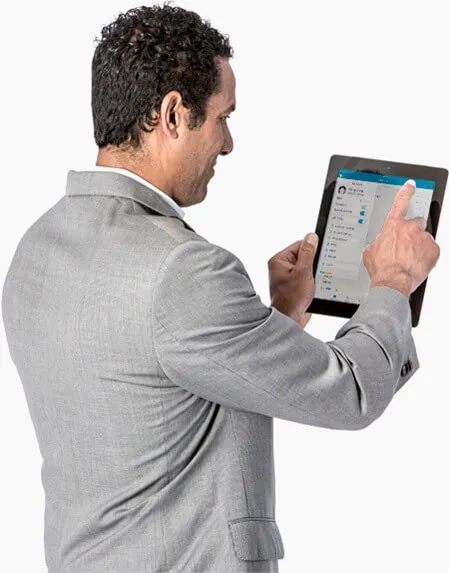

Table of contents
- Call management definition and meaning
- What is a call management system?
- What does call management mean in a contact center rather than a traditional call center?
- Common call management features
- What is call management on cell phones?
- Benefits of call management systems
- Does my business need a call manager system?
- What makes a good service vendor?
Call management definition and meaning
Call management refers to the processes and systems businesses and organizations use to handle incoming calls. It ensures customers are receiving timely and satisfactory responses to their calls, as well as tracks callers to build relationships with clients and prospects.
If your business uses call center solutions then an efficient management system is crucial for handling, tracking, and collecting data from calls. Businesses need to implement a successful system that allows them to manage customer calls effectively to deliver great customer experiences.
What is a call management system?
This system is implemented by businesses to keep their call volume managed and under control. They’re usually voice-over-internet-protocol (VoIP)-based software, so their features can vary.
What is a call management software?
A call management software routes calls through telephone systems according to set parameters, and helps your business to effectively manage inbound and outbound calls.
How do call management systems work?
Calls are intelligently routed according to the calling features and parameters that are outlined in the system. These include elements such as a call queue, IVR menus, and hunt groups. Call distribution can be carried out using skills-based routing, or according to the time, date, or location of the call.
Various call features provide the caller with a customized experience, allowing them to choose how they communicate with a business. What’s more, these features maximize agent handling efficiency by reducing time spent on time-consuming tasks.
What does call management mean in a contact center rather than a traditional call center?
In today’s digital world, contact is no longer made through telephones alone. Customers expect to communicate with businesses across a diverse range of digital channels including email, social media, SMS messaging, live chat, and more.
In a contact center, business systems are equipped to handle all kinds of operations.
Today, the best contact center software intelligently routes calls to the right agents, provides additional context for employees, and enables management to successfully execute an omnichannel strategy.
Traditional routing
There are three types of traditional routing in call centers:
| Routing | Function |
|---|---|
| ACD-based routing | Routes the longest waiting call to the first available advisor. If no advisor is available, the call is placed in the queue. |
| Priority-based routing | The ACD system builds queues based on caller priority. |
| Skills-based routing | Calls are routed to the most qualified agent. If no qualified agent is available, the call remains in a dedicated queue until one is freed up. |

Intelligent routing in contact centers
Contact center software can be integrated with a business’s CRM system. The data is used to inform automatic routing strategies, provide additional context and ensure customers are directed to the right team member/resource across any channel.
The routing algorithm responds to a set of business rules that are set relating to various customer attributes including intent, interaction history, time in queue, and more. This means the call is effectively directed to the most qualified agent for frictionless customer service.
In previous IVR phone system models, customers have been routed to an agent who, in the end, may or may not have been able to solve their request. Modern contact centers use digital and voice-centric customer contact options to allow for communication across any channel while still maintaining intelligent routing across any channel..
Artificial intelligence algorithms and machine learning technologies can accurately categorize customer issues as they come in, and efficiently route them to the more appropriate agent or department
Successful intelligent routing results in:
- More personalized customer engagement with better contextual understanding
- Improved first contact resolution
- Improved productivity and workflow management
- Integrated service across all channels
- A single platform with a unified omnichannel desktop for optimized management
Routing contact phone calls to resources
As well as being routed to the right live agent, contacts can be routed to resources like self-service solutions (knowledge base, the FAQ section of a website, etc) or to a chatbot that can handle simple requests and pass them on to a live agent when they become more complicated.
Common call management features
Every business has its own needs to fulfill and objectives to achieve, so you’ll need to find a system that provides the best solution for your business. Each system provides various calling features that companies can use to meet customers’ needs and enhance engagement. That being said, there are some fundamental features to consider.
Automatic call distribution (ACD)
With this feature, a system automatically routes callers to relevant team members or departments. An ACD system distributes calls according to specified criteria.
Call recording and call tracking
Call recording allows businesses to record customer calls and monitor team performance.
Call tracking provides agents with contextual information about the person who is calling. This information is used to route calls based on caller data and allows support teams to personalize the customer experience.
Interactive voice response for a business phone system
This is an automated business phone system feature that interacts with callers, gathers information, and provides them with menu choices. The interactive voice response system performs actions based on caller voice response or their keypad inputs.
Call queues
Call queues hold callers in a queue when all of the support agents are busy. This feature allows agents to use metrics in their dashboards to view call queue information and make decisions based on data in real-time.
Call control service
Call control, also known as call processing, is a business phone system or PBX function that routes calls to the proper destination.
What does call control mean?
It refers to simultaneous call handling functionality such as hold, mute, transfer, hanging up, and so on. Most software solutions allow call control management within the browser, so agents can control calls with the click of a mouse.
How do I control incoming calls?
- Set your call schedule to accept calls on your terms
- Customize individual extensions to take business calls after business hours
- Prevent spam and unwanted callers by blocking their phone numbers from your call history
- Call blasting is an added feature that allows you to ring forwarding numbers simultaneously to get an instant response
Call monitoring
This feature allows managers to listen in on calls as they’re happening, without the agent or caller knowing. It allows managers to understand how agents are performing, and inform training sessions and team meetings. Progressive solutions enable business owners and managers to track live calls from anywhere, as long as they have an internet connection.
CRM integration
The system should be easily integrated with a company’s customer relationship management software. This enables businesses to use customer data stored in CRM solutions to deliver more personalized customer support, while also allowing agents to prioritize important interactions.
Real-time and historical reporting
With this feature, businesses can access a complete performance management report of your agents. You can track:
- The number of calls made
- The number of call received
- The quality of calls
- Handle times
- How often calls are escalated, and much more.
It’ll also provide insights into general issues within the team that are affecting overall performance.
What is call management on cell phones?
This refers to the process of managing calls on a mobile device. The cell phone user installs a mobile app to simplify daily call tasks and facilitate uncommon phone call-related tasks that can’t be achieved with native commands. What’s more, the user can access voicemails without having to call an operator.
What is a call management app?
A call management app simplifies daily calling tasks from cellular devices. These apps use a powerful rules-based filter that intelligently takes and rejects calls according to which actions are relevant to you. These apps can increase productivity and save the mobile owner time and money. For business owners, these apps allow you to remain connected and ensure you’ll never miss an important business call.
Benefits of call management systems
Integrating a management system into the fabric of your business has many benefits including:
- Reduced lost or abandoned calls: By analyzing the data collected by the system, a company can cut the amount of lost or abandoned calls. What’s more, effective call routing ensures that calls are dealt with efficiently.
- Improved agent efficiency and productivity: Gathered data can be used to manage staff levels and ensure customers aren’t left waiting at peak times. Intelligent routing ensures that calls are routed to the most appropriate agent every time, which enables teams to keep on top of traffic and reduces downtime.
- Enhanced customer service: Call routing puts callers in contact with the agent most qualified to answer their requests. The agent has access to a record of the customer’s previous interactions and information about their needs. This enables them to provide quicker and more effective customer service to deliver a personalized and memorable customer experience (CX).
- Improved performance management: Call recording and call monitoring allow managers to track and assess employees’ performance, identify training needs, and ensure procedures are being followed.
- Lower costs: Call management systems increase your agent productivity. This allows them to handle more customer requests and work more efficiently, reducing costs caused by employee underperformance.

Does my business need a call manager system?
How do you know if your business will benefit from a management system for inbound calling? If your business handles customer interactions via the phone you can reap the benefits of this kind of system. Consider these questions when deciding whether a management system is for you:
Does your business follow an appointment-based model?
If your customers make appointments to purchase your products or services, then it’s likely that your customers will call to book over the phone with a live representative. A management system for calls enables businesses to streamline customer service operations resulting in a better CX.Do you have a dedicated inbound call handling team?
If your business has a front office staff for answering calls, an in-house call answering department, or utilizes a call center, then you’ll benefit from a management system and data insights to understand call outcome rates.Does your business rely on returning customers?
If your business depends on repeat customers, then you can benefit from a system that will allow you to nurture them over time. By offering great customer service you can create loyal customers. What’s more, analytics and data will enable you to personalize service and determine who to market to.

What makes a good service vendor?
Management systems for inbound calls have been around for a while now, and nowadays there are plenty of companies on the market that offer fantastic solutions for all kinds of business.
With so many companies to choose from, how do you know which one is right for your business?
Below is a checklist of points to consider when choosing the right solution to suit your needs:
- Experience: Consider whether the company providing the system has ample experience in the sector and whether they’ll be able to support your business’ goals.
- Reliability: This company will be in part responsible for handling your phone lines, so reliability is crucial. Consider whether the vendor scores calls based on algorithms that potentially won’t fit the calls to and from your business.
- Specified industry knowledge: Some vendors are focused on specific industries. If your business falls into a niche industry that requires specific industry knowledge, then it’s important to make sure the vendor can deliver what you need before you commit to them.
- Customer service and onboarding: Implementing a new management platform in your business processes is a big commitment. The vendor needs to provide you with the support and service you need during the onboarding phase. A dedicated representative should be assigned to your business to help you to understand the data and how to turn it into actionable goals.
- Pricing: Consider the features you need from a system to improve your business operations. Make sure to choose a transparent company that’s upfront about short term and long term costs to ensure you get the best pricing model to suit your needs.
- Integrations: If you work with specific CRMs or sales and marketing software, then you must choose a system that can integrate seamlessly with your existing platform.

What should I do before implementing a call management system?
If you’ve selected your service vendor, you’ll need to define your business objectives before implementing your new system.
When it comes to defining your business objectives, you should create SMART goals for your business team. SMART goals are goals that are specific, measurable, achievable, relevant and time-bound.
Example SMART goals
Some general examples of SMART goals for contact centers include:
- Increase the minimum number of customer interactions per day from 20 to 25 within the next six months
- Reduce average call handle time from five minutes to four minutes by the end of the year
- Increase the first response time for all social media requests by 25% within three months
You’ll also need to designate a call managing team and create clear expectations around their responsibilities. That’s alongside establishing accountability regarding the reports and data they’ll use. Remember to create an open and honest environment with your team, in which they feel comfortable providing and asking for feedback.

Ensure every incoming call gets handled perfectly with top call management software
A call management software solution can help to streamline call operations, improve CX, and boost your business to where it needs to be to achieve your objectives. If you operate a call center or rely on phone communications to support or nurture your customers, then calling features and intelligent routing can improve interactions and boost employee productivity.
Selecting the best call management software requires a lot of thought and consideration. Businesses need to evaluate all of the available options to find one that provides all the solutions to suit them. The selected vendor should support your business goals and provide an adequate level of support to help you to grow your business.
RingCentral inbound contact center solution provides a robust set of features to streamline and enhance call management. It features skills-based routing, powerful analytics, and agent management, and more—allowing support teams to better serve and support customers. With omnichannel capabilities and intelligent routing, users can reach their customers in the right time, at the right place. Always.
Want to know more about RingCentral’s inbound call management software solution and how it can take business support to new levels? Sign up today for a free demo and we’ll take you through it, step by step.